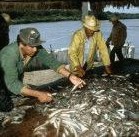Nepal sees potential in aquaponics
Published: September 19, 2012
Source : SciDev.Net. Smriti Mallapaty
Nepal sees food security potential in aquaponics, a combination of aquaculture and hydroponics.
Aquaculture efficiently farms fish species while hydroponics ensures controlled use of water and nutrients in plant cultivation.
In aquaponics, water saturated with nutrient-rich fish excreta from aquaculture tanks is used in plant breeding before being circulated back.

Nepal is exploring the potential of aquaponics.
FAO / R. Faidutti
FAO / R. Faidutti
The technology produces fish and vegetables without the need for costly fertilisers, says Ram Bhujel, director of the World Aquaculture Society, a not-for-profit global network of aquaculture rofessionals affiliated to the Asian Institute of Technology, Thailand.
Aquaponics research and development has advanced over the last three decades, with several thousand household-level systems installed in the United States and Australia.
The Rotary Club of Patan, Nepal, and the Rotary Club of Brussels – with funding from Rotary International and technical support from the social enterprise, Aquaponics UK – already run an aquaponics unit that supports a rehabilitation home for 20 children and mothers affected by HIV/AIDS.
The system, operating since August, cost US$ 10,000 with annual production estimated to be worth US$ 8,000.
In 2013, the Nepal government will survey operating units in the country and also consider setting up an experimental site, Tek Bahadur Gurung, director of livestock and fisheries research at the Nepal Agricultural Research Council, told SciDev.Net.
In Nepal's mid-hills, "most water sources are 300 metres below human settlements, which makes access laborious," said Gurung. Reducing water demand through aquaponics could ease this.
The technology is suited to urban areas where land is scarce, said Bhujel. But, due to high capital investment, it "has not been a profitable business for lower income people," he said.
A major challenge in Nepal, which faces long power cuts during winter, is the cost of energy backup to keep the system running continuously, says Bill Ashwell, director of the Hope Bioponic Foods Company, which runs a research unit in Kathmandu.
There is potential for community-run systems that use local fish, and the flow from rainwater and streams to save on energy needed for recirculation, Ashwell told SciDev.Net.
The technology holds promise for rural communities, "especially for densely-populated countries like Bangladesh, Nepal and Vietnam, where farmers have limited land to provide their families food with protein, minerals and vitamins," Bhujel said.
Source
SciDev.Net. Smriti MallapatyRelated topics
Join to be able to comment.
Once you join Engormix, you will be able to participate in all content and forums.
* Required information
Would you like to discuss another topic? Create a new post to engage with experts in the community.
Create a post25 de febrero de 2019
We can do this in western part of nepl i.e butwal. Need some business detail in this case
Freshwater Solutions- Ecological aquaculture
26 de julio de 2015
@
chandra karanjit Thank you for your offer, that makes two of us in the team.
26 de julio de 2015
oh sorry for it. I am able to help voluntar only. if need voluntar I am ready any time.
Freshwater Solutions- Ecological aquaculture
26 de julio de 2015
@ chandra karanjit its called funding.
26 de julio de 2015
I did not understand what do you mean. I am ready to working on this project. can you make me clear.
Freshwater Solutions- Ecological aquaculture
25 de julio de 2015
I would be happy to set up an ecological aquaponics system in Nepal, but no one has asked.
25 de julio de 2015
I am planning to do aquaponics in kathmandu, I am not a profesional fisheris bussiness person. I am studying in this topic and business from last two month. If I need to collect more knowledge where I can contact.
21 de septiembre de 2012
In a country where most fish farmers do not understand fish culture very well. and very few have some knowledge, I do not think hydroponics will be the most feasible development for fish farmers. So if any development agency or fisheries professional wants to develop hydroponics it will not be the best option to develop fisheries in Nepal, but it could be a good business for the ones who want to develop farmers. Why is it that some development agencies are jumping development stages? But people are right if they see a great development potential in aquaculture in Nepal.
Freshwater Solutions- Ecological aquaculture
19 de septiembre de 2012
I see a great opportunity for water farming in Nepal, please get in touch
L. Hutchinson
Director
Freshwater Solutions
www.ecological-aquaculture.co.uk
Email: ecologicalfish@btinternet.com


